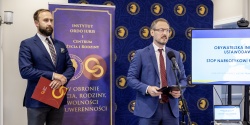Published: 22.08.2024

• Consumption of pornographic content among children and adolescents is a growing problem and concerns those of younger and younger ages.
• Studies show that about 3/4 of minors in Poland say they can access pornography without difficulty.
• The Ordo Iuris Institute has drafted a bill to restrict access to pornography among children.
• The planned regulation aims to oblige the administrators of pornographic websites to introduce effective verification of users’ ages.
• Failure to implement such measures would result in Internet service providers blocking portals and payment services.
• The Ordo Iuris Institute has begun to collect signatures in order to register a citizens’ legislative initiative committee on this issue.
The draft act was presented at a press conference on August 12.
The problem of minors’ access to pornographic content, as well as their routine use of pornography, involves an increasingly wide group of young people all over the world. Statistics presented by various research centers indicate that not only has the number of regular users of pornography increased in recent years, but the age of first contact with this type of material has been considerably reduced.
In a 2022 report by the National Research Institute (NASK), 73 per cent of children declared that they had no difficulty in finding pornography. The age of those accessing pornographic sites has also decreased. In Poland, 55 percent of children had seen pornography before they turned 12. A vast majority of them use electronic devices to search for it.
Specialists in the field of developmental psychology have left no doubt that any contact with pornography negatively influences a young person’s brain development, as well as the development of his or her attitudes, relationships, and interactions. As scientists from the Polish Academy of Sciences point out, the mechanism of compulsive pornography use is identical to the addictive mechanism involved in gambling and the use of psychoactive substances. Importantly, as of 1 January 2022 the World Health Organization now includes a new disease classification in the International Statistical Classification of Diseases and Health Problems (ICD-11): compulsive sexual behavior disorder.
Due to wider recognition of the tragic consequences of pornography consumption by young people, work on effective child protection has recently begun in countries such as France, the United Kingdom, Canada, and the United States. Italy, among others, is also preparing to introduce protective mechanisms.
The aim of the citizens’ bill drafted by Ordo Iuris is to introduce a general ban on making pornographic material available on the Internet in a way that allows it to be viewed by minors on Polish territory. Owners of such sites should be obliged to introduce an effective mechanism to verify the user’s age. The effectiveness of such an age verification system should then be assessed by a relevant authority. Websites which fail to implement such verification solutions should then be placed on a central register. Sanctions for non-compliance would entail the blocking of such sites by Internet service providers and the disabling of payment services on Polish territory for those sites.
This model ensures that there will be a uniform list of blocked sites, legal security measures, and a transparent criterion by which ISPs will block specific websites. In addition, such regulation solves the difficulties related to law enforcement abroad, as there is no need for that whatsoever. It suffices for the administrative authority to recognize that a particular website containing pornographic content fails to comply with the statutory obligation and to impose a sanction in the form of placing said domain in the register of blocked websites throughout Poland via the Internet service providers.
The draft stipulates that the minister responsible for information technology will, by means of a regulation, specify the detailed conditions for the effective implementation of the age verification system that would also be safe from the users’ point of view. It is particularly important that the age verification mechanism should not allow for the storage of personal data. The assessment of the age verification mechanisms after they are implemented would be carried out by the President of the Office of Electronic Communications, whom the draft establishes as the competent authority for the protection of minors from pornographic content on the Internet. His tasks would include, among others, testing the effectiveness of the mechanisms used to verify the age of majority of a particular user, and would also include control and evaluation in terms of how they comply with the criteria established in the aforementioned regulation of the minister responsible for information technology.
The Ordo Iuris Institute has begun to collect signatures supporting the establishment of a citizens’ legislative initiative committee in the Sejm, which is Poland’s lower house of parliament. Once the Marshal (Speaker) of the Sejm agrees to the committee’s registration, the collection of signatures for the act itself will begin. In order to submit the act to the Marshal’s office and oblige the Sejm to discuss it and hold a vote, 100,000 signatures of citizens are needed.
This project was presented at a press conference. Rafał Dorosiński, an attorney sitting on Ordo Iuris’ Board, emphasized the problem of minors having unrestricted access to pornography:
“73 percent of children and adolescents declare that it is extremely easy for them to access pornographic content. The average age at which exposure to pornography takes place is as low as 11 years. One in four teenagers admits to viewing pornographic films and images on a daily basis. Additionally, about one in four teenagers likewise express concern about becoming addicted to pornography.”
Psychologist Bogna Białecka, chairwoman of the Foundation for Health Education and Psychotherapy, explained the destructive impact of pornography on the development of children:
“Early contact with pornography makes it more likely, or even almost guaranteed, that compulsive sexual behavior will occur, but additionally, frequent viewing of pornography affects the developing brain. As a result, such a brain never matures. Children who watch pornography on a consistent basis will not have a fully mature brain.”
For his part, Marcin Perłowski, director of the Center for Life and Family, presented the activities which have been planned related to the drafting of the citizens’ legislative initiative:
“We are going to try to present a project that will bring about an act in the Polish parliament by means of a citizens’ legislative initiative. We are entering the first stage – that is, we are first collecting a thousand signatures in order to be able to present it to the Marshal of the Sejm and then acquire legal status for our legislative initiative committee. Then we will start to collect signatures nationwide.”

12.05.2025
On April 29, the administration of President Donald Trump celebrated its first 100 days in office. Most of President Trump’s motivations could be explained within an economic framework, which aligns with his lifelong experience as a successful businessman. His preoccupation seems to be with improving the efficiency and effectiveness of the government and the economy, achieving prosperity, and the peace it requires.

02.05.2025
· The Ordo Iuris Institute, the Hungarian Center for Fundamental Rights, and the Foundation of the Patriots for Europe group in the European Parliament organized a conference in W

17.04.2025
• The Ordo Iuris Institute has prepared an opinion for the UN as part of a thematic report on surrogacy and its impact on the rights of women and children.

09.04.2025
• On April 8, the Ordo Iuris Institute presented the Polish version of a document with proposals for reforming the European Union, prepared jointly with Hungary’s Mathias Corvinus Collegium (MCC).